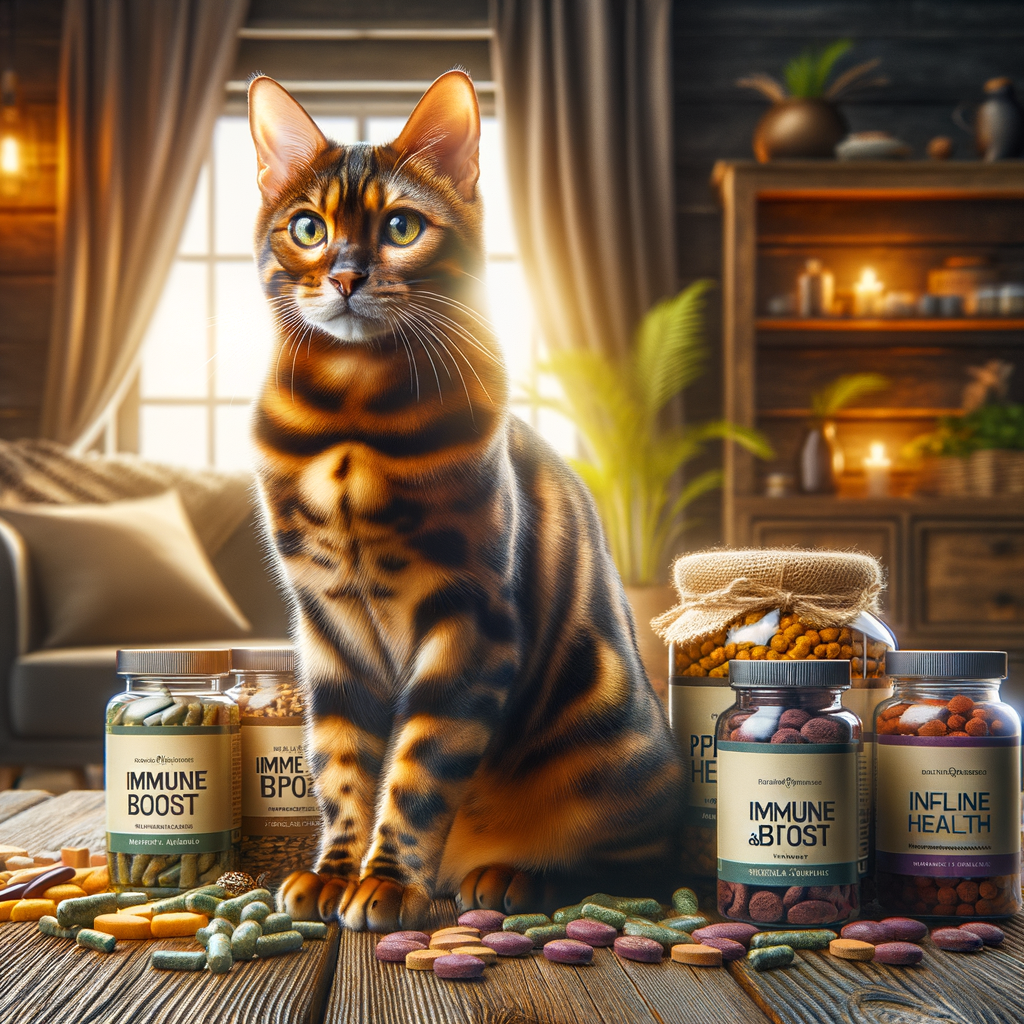
Introduction to Bengal Cat Health
Bengal cats are special. They are known for their wild looks and playful nature. But, they also have unique health needs. Bengals are active and curious, so they need extra care to stay healthy. Regular check-ups with the vet are important to catch any health issues early.
- Importance of a balanced diet and supplements:
Feeding your Bengal cat a balanced diet is crucial. They need high-quality food rich in protein. Sometimes, supplements can help too. For example, Omega-3 fatty acids can support their shiny coat and healthy skin. Always talk to your vet before adding any supplements to their diet.
Essential Bengal Cat Supplements
- Vitamins for Bengal Cats
Vitamins are crucial for your Bengal cat’s health. They help with growth, vision, and immune function. For example, Vitamin A supports good vision and skin health. Vitamin E is important for muscle and heart health.
Ensure your cat gets a balanced diet with these vitamins. You can find them in high-quality cat food or as separate supplements.
- Natural Supplements for Cats
Natural supplements can boost your Bengal cat’s overall well-being. Omega-3 fatty acids, found in fish oil, support a shiny coat and healthy skin. Probiotics help with digestion and can prevent stomach issues.
Always choose natural supplements that are safe for cats. Consult your vet before adding any new supplement to your cat’s diet.
- Supplements for Cat Immune System
A strong immune system keeps your Bengal cat healthy. Supplements like Vitamin C and Echinacea can boost their immunity. These help fight off infections and keep your cat active and happy.
Look for immune-boosting supplements in pet stores or online. Make sure they are specifically made for cats.
Bengal Cat Health Tips
Importance of Regular Check-ups
Regular check-ups are essential for keeping your Bengal cat healthy and happy. These visits to the vet help in monitoring your cat’s overall well-being and catching any potential health issues early.
- Preventive care and early detection of health issues: Regular vet visits allow for preventive care, such as dental cleanings and parasite control. Early detection of health problems can make a big difference in treatment success. For example, catching kidney disease early can help manage the condition better.
- Importance of regular vaccinations: Vaccinations protect your Bengal cat from common feline diseases like rabies, feline distemper, and feline leukemia. Keeping up with vaccinations ensures your cat stays healthy and reduces the risk of spreading diseases to other pets.
| Check-up Frequency | Benefits |
|---|---|
| Every 6 months | Early detection of health issues, updated vaccinations, and preventive care. |
| Annually | Comprehensive health evaluation and necessary treatments. |
Exercise and Mental Stimulation
- Importance of regular physical activity
Bengal cats are known for their high energy levels. Regular physical activity is crucial for their health and happiness. Without enough exercise, they can become bored and even develop health problems. Aim for at least 30 minutes of active play each day.
Physical activity helps Bengal cats maintain a healthy weight, improves their cardiovascular health, and strengthens their muscles. It also reduces the risk of obesity-related issues like diabetes and joint problems.
- Interactive toys and games for mental stimulation
Mental stimulation is just as important as physical exercise for Bengal cats. Interactive toys and games can keep their minds sharp and prevent boredom. Puzzle feeders, laser pointers, and feather wands are excellent choices.
These activities mimic hunting behaviors, which are natural for Bengal cats. Engaging their minds helps reduce stress and anxiety, leading to a happier and healthier pet.
| Activity | Benefits |
|---|---|
| Chasing laser pointers | Improves agility and provides mental stimulation |
| Playing with feather wands | Encourages natural hunting instincts and physical exercise |
| Puzzle feeders | Enhances problem-solving skills and slows down eating |
Incorporating both physical and mental activities into your Bengal cat’s daily routine will ensure they lead a balanced and fulfilling life. Remember, a happy cat is a healthy cat!
Bengal Cat Nutrition
- Understanding the carnivorous nature of Bengal cats:
Bengal cats are obligate carnivores. This means they need meat to thrive. Their bodies are designed to digest and use nutrients from animal sources. Unlike humans, they can’t get all their nutrients from plants.
- Importance of high-quality protein in their diet:
Protein is crucial for Bengal cats. It helps them build strong muscles and maintain a healthy coat. Look for cat food with real meat as the first ingredient. Avoid foods with too many fillers like corn or soy.
- Role of supplements in filling nutritional gaps:
Sometimes, even the best cat food might miss some nutrients. Supplements can help. For example, Omega-3 fatty acids support a shiny coat and healthy skin. Always talk to your vet before adding supplements to your cat’s diet.
| Nutrient | Importance | Sources |
|---|---|---|
| Protein | Builds muscles and supports growth | Chicken, beef, fish |
| Omega-3 Fatty Acids | Promotes healthy skin and coat | Fish oil, flaxseed |
| Taurine | Essential for heart and eye health | Meat, fish |
Feline Health Supplements
Choosing the right supplements for your Bengal cat is important for their health. Here are some tips to help you make the best choice.
- Factors to consider when choosing supplements:
- Age: Different ages need different nutrients.
- Diet: Check if their food already has some supplements.
- Health Issues: Some health problems need special supplements.
- Quality: Always choose high-quality brands.
- Consulting with a vet for personalized advice:
- Expert Opinion: Vets know what is best for your cat.
- Health Check: A vet can check if your cat needs supplements.
- Safety: Vets ensure the supplements are safe for your cat.
Case Studies: Impact of Supplements on Bengal Cat Health
Case Study 1: Improvement in Immune System with Supplements
In this case study, a Bengal cat named Luna showed significant improvement in her immune system after taking supplements. Luna was often sick and had low energy levels. Her owner decided to try a supplement rich in antioxidants and vitamins.
Results:
- After 3 months, Luna’s vet noticed fewer infections.
- Her energy levels increased, and she was more playful.
- Blood tests showed a stronger immune response.
This case highlights how supplements can boost a Bengal cat’s immune system, making them healthier and happier.
Case Study 2: Impact of Vitamins on Coat Health
Another Bengal cat, named Simba, had a dull and rough coat. His owner introduced a supplement containing Omega-3 fatty acids and biotin.
Results:
- Within 2 months, Simba’s coat became shinier and softer.
- There was less shedding and fewer hairballs.
- Simba’s skin also appeared healthier with fewer irritations.
This case demonstrates the positive effects of vitamins and fatty acids on a Bengal cat’s coat health.
Conclusion: Ensuring Optimal Health for Your Bengal Cat
Supplements play a crucial role in maintaining your Bengal cat’s health. They help fill nutritional gaps that regular cat food might miss. For example, Omega-3 fatty acids can improve your cat’s coat and skin, while probiotics support digestive health. Adding the right supplements can greatly impact your Bengal’s overall well-being.
- Final thoughts on Bengal cat health and nutrition:
Taking care of a Bengal cat means paying close attention to their unique health and nutritional needs. Regular vet check-ups, a balanced diet, and the right supplements are essential. Remember, a healthy Bengal cat is a happy Bengal cat. By following these guidelines, you can ensure your feline friend leads a long, healthy, and joyful life.






